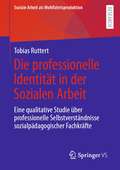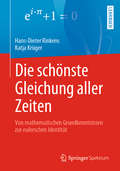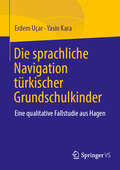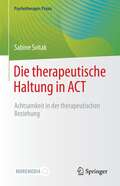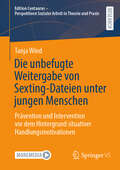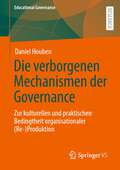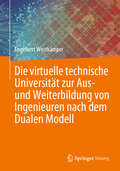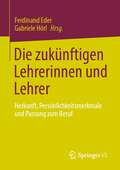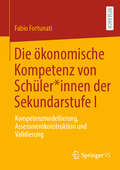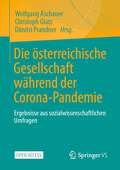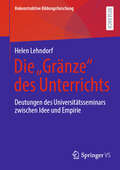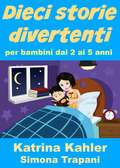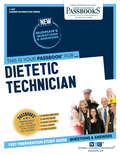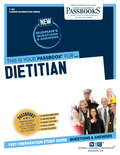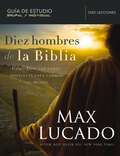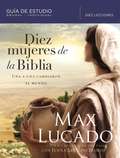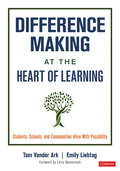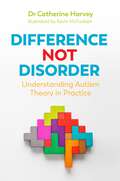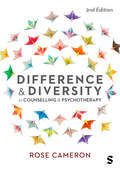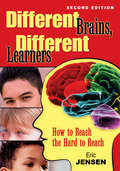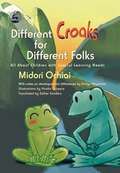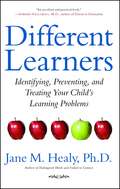- Table View
- List View
Die professionelle Identität in der Sozialen Arbeit: Eine qualitative Studie über professionelle Selbstverständnisse sozialpädagogischer Fachkräfte (Soziale Arbeit als Wohlfahrtsproduktion #23)
by Tobias RuttertTobias Ruttert kommt in der vorliegenden Studie zu dem Ergebnis, dass aus der Sicht sozialpädagogischer Fachkräfte ein großer Teil des identitätsbezogenen, introspektiven Abgleiches anhand des Kriteriums „gekonnte Beruflichkeit“ erfolgt, weshalb insbesondere handlungs- und erfahrungsbezogene Elemente von besonderer Bedeutung sind. Darüber hinaus verfügen die Professionellen über ein ausgeprägtes, kritisch-reflexives Professionsbewusstsein. Vor diesem Hintergrund ist einer vermeintlichen Identitätsproblematik sozialpädagogischer Fachkräfte, wie es der Diskurs suggeriert, vehement entgegenzutreten.
Die schönste Gleichung aller Zeiten: Von mathematischen Grundkenntnissen zur eulerschen Identität
by Katja Krüger Hans-Dieter RinkensIn diesem Buch geht es um die fünf wichtigsten Zahlen: Außer 0 und 1 gibt es kaum noch wichtigere Zahlen als π, i und e.Die Kreiszahl π ist nicht nur eine Sache der Geometrie: Bekanntes wird aufgefrischt und Erstaunliches hinzugelernt. Die imaginäre Einheit i befreit uns von der Rechenstörung, aus negativen Zahlen nicht die Wurzel ziehen zu dürfen oder zu können. Die Euler-Zahl e liegt fast allen Wachstums- und Zerfallsprozessen zugrunde: Die e-Funktion ist wohl die wichtigste mathematische Funktion überhaupt. In dem Lehrbuch geht es um eine bemerkenswerte Beziehung zwischen den fünf Zahlen, die Eulersche Gleichung, "die schönste Formel der Mathematik", wie viele Mathematiker finden. Es soll den Weg zum Verständnis der geheimnisvollen Formel beschreiben. Dieser Weg führt durch zentrale Gebiete der Mathematik: Geometrie einschließlich Trigonometrie, Arithmetik und Algebra sowie Analysis mit einem Blick in wissenschaftliches Rechnen. Nicht die Systematik dieser Gebiete steht im Vordergrund, sondern die fundamentalen Ideen, die zum Entstehen der Formel beitragen.
Die sprachliche Navigation türkischer Grundschulkinder: Eine qualitative Fallstudie aus Hagen
by Erdem Uçar Yasin KaraDieses Buch untersucht die sprachliche Orientierung und Bewältigungsstrategien türkischstämmiger Grundschulkinder in einem deutschen Schulkontext. Im Zentrum steht eine qualitative Fallstudie aus Hagen, die aufzeigt, wie Kinder zwischen Erst- und Zweitsprache navigieren. Die Ergebnisse liefern praxisrelevante Erkenntnisse für Sprachförderung und interkulturelle Bildungsarbeit.
Die therapeutische Haltung in ACT: Achtsamkeit in der therapeutischen Beziehung (Psychotherapie: Praxis)
by Sabine SvitakDieses Therapiemanual beschreibt für Psychotherapeutinnen und Psychotherapeuten die therapeutische Allianz aus der ACT-Perspektive (ACT: Akzeptanz- und Commitment-Therapie), einem Therapieverfahren, das klassisch kognitiv-verhaltenstherapeutische Interventionen mit achtsamkeits- und akzeptanzbasierten Strategien kombiniert. An der Praxis orientiert, stellt die Autorin zunächst die theoretischen Grundlagen dar. Sie macht danach das sog. Hexaflex der ACT nutzbar: sechs Prozesse, angewandt auf die therapeutische Beziehung, welche Leserinnen und Leser kennenlernen, reflektieren und in der eigenen Praxis einsetzen können. Audio-Übungen und Fallbeispiele runden die Lektüre ab. Dieses Buch unterstützt Therapeutinnen und Therapeuten nicht nur in einer Beziehungsgestaltung, die die Therapie wirksamer werden lässt, sondern auch in einem selbstfürsorglichen Umgang als Prävention des Burnouts in der therapeutischen Arbeit. Mit Gewinn lesbar auch ohne ACT-Kenntnisse. Stichworte aus dem Inhalt: Therapeutische Haltung und Beziehung – Achtsamkeit – ACT – Defusion – Akzeptanz – Präsenz – Selbst als Konzept – Werte – Engagiertes Handeln. Über die Autorin: Dr. phil. Dipl.-Psych. Sabine Svitak, Psychologische Psychotherapeutin, Verhaltenstherapeutin, Supervisorin und Ausbilderin, seit 2011 niedergelassen in eigener Praxis, interessiert sich insbesondere für die Integration von achtsamkeitsbasierten Verfahren in der kognitiven Verhaltenstherapie. Leitung von ACT-Fortbildungen und engagiert in der ACT-Community.
Die unbefugte Weitergabe von Sexting-Dateien unter jungen Menschen: Prävention und Intervention vor dem Hintergrund situativer Handlungsmotivationen (Edition Centaurus - Perspektiven Sozialer Arbeit in Theorie und Praxis)
by Tanja WindWerden Bild- oder Videodateien, welche im Rahmen einvernehmlichen Sextings erhalten wurden, unbefugt an dritte Personen weitergegeben, hat dies nicht nur Auswirkungen auf die Geschädigten; auch die Weitergebenden erleben Konsequenzen. Das vorliegende Buch fokussiert verschiedene motivationale Aspekte vor dem Hintergrund situativer Einflussfaktoren hinsichtlich der unbefugten Weitergabe von Sexting-Dateien. Schließlich werden auf Grundlage der gewonnen Erkenntnisse Handlungsempfehlungen für Prävention und (strafrechtliche) Intervention gegeben.
Die verborgenen Mechanismen der Governance: Zur kulturellen und praktischen Bedingtheit organisationaler (Re-)Produktion (Educational Governance #50)
by Daniel HoubenGovernance als Zustandekommen, Aufrechterhaltung und Transformation sozialer Ordnung in Mehrebenensystemen bedarf analytischer Perspektiven, die neben rationalistischen und formalistischen Ansätzen auch den ordnungsstiftenden Wirkungen kultureller Sinnmuster und präreflexiver Praktiken gerecht werden. Daniel Houben schlägt vor, dazu auf den soziologischen Neoinstitutionalismus und die Theorie Bourdieus zurückzugreifen und arbeitet drei Perspektiven auf ordnungsstiftende Logiken heraus, die je an einem distinkten Beispiel ausgeführt werden: Die habitualisierte Ordnung zeigt, wie Mitglieder einer Organisation ihre professionellen Habitūs mit dem Institutionengefüge jener Organisation synchronisieren oder eben daran scheitern. Anhand des Bologna-Prozesses wird Hochschullehre als eine sich in habitualisierten Routinen vollziehende Praxis illustriert. Die Perspektive der valorisierten Ordnung fokussiert Legitimitäten oder symbolische Herrschaftsverhältnisse. Am Beispiel der von New Public Management induzierten Verschiebungen in den Wertmaßstäben wissenschaftlicher Forschung und Lehre wird analysiert, wie sich Legitimitäten durch sukzessive Re-Valorisierungen auf mehreren Ebenen in wechselseitiger Abhängigkeit zueinander wandeln. Die Perspektive der positionalen Ordnung fragt nach der relationalen Bedingtheit sozialer Ordnung. Am Beispiel der Hochschulräte deutscher Universitäten werden somit Muster und Logiken ihrer Besetzung offenkundig.
Die virtuelle technische Universität zur Aus- und Weiterbildung von Ingenieuren nach dem Dualen Modell
by Engelbert WestkämperNeue Wege in der technischen Aus- und Weiterbildung Dual bis zur höchsten wissenschaftlichen Promotion - Wanderung (Walz) zum Lernen bei den Besten Plattform der Virtuellen Universität Die Digitalisierung eröffnet der Aus- und Weiterbildung den Weg zur Virtuellen Universität. In diesem Buch wird der Schwerpunkt auf die Ausbildung von Ingenieuren an einer Universität gelegt, welche durch ein duales und anwendungsnahes Modell der Qualifizierung von Ingenieuren geprägt wird und einen neuen Weg zur lebensbegleitenden Weiterbildung zeigt. Es folgt der Philosophie der forschungsorientierten – Universität, die auch Ingenieure in der Praxis begleitet. Das Buch enthält Modelle zum Lernen von den Besten auf einer zeitlich begrenzten Wanderung bzw. Walz für Ingenieure.
Die zukünftigen Lehrerinnen und Lehrer: Herkunft, Persönlichkeitsmerkmale und Passung zum Beruf
by Gabriele Hörl Ferdinand EderDie jungen Menschen, die jetzt ein Lehramtsstudium beginnen oder neu in den Beruf eintreten, werden über viele Jahre das Bild der Lehrerin/des Lehrers in der Öffentlichkeit bestimmen und das Leben an den Schulen prägen. Für die Steuerung des Bildungswesens erscheint es wichtig zu wissen, welche Bereiche der Gesellschaft sie repräsentieren, welche Eigenschaften sie mitbringen und wie gut sie voraussichtlich den beruflichen Anforderungen entsprechen können.Die Beiträge des Buches bieten Antworten auf diese Fragen. Die Basis dafür bilden Stichproben von (österreichischen) Lehramtsstudierenden aus den Jahren 2005 bis 2016, die zu Studienbeginn befragt und zum Großteil in ihrem Studienverlauf verfolgt werden.
Die ökonomische Kompetenz von Schüler*innen der Sekundarstufe I: Kompetenzmodellierung, Assessmentkonstruktion und Validierung
by Fabio FortunatiDieses Buch thematisiert die Erhebung der ökonomischen Kompetenz von Schüler*innen der Sekundarstufe I und verfolgt dabei drei Forschungsziele: (1) die Konzeption und Modellierung der ökonomischen Domäne, (2) die modellbasierte Entwicklung eines Testinstruments zur Messung ökonomischer Kompetenz und (3), wie unterschiedliche Evidenzquellen, bezogen auf die Curriculum-Instruction-Assessment-Triad, die Validität der Testwertinterpretation in der ökonomischen Domäne sicherstellen können. Das entwickelte Testinstrument TBA-EL wurde anhand des Evidence-centered-Designs entwickelt und stellt einen psychologischen Leistungstest dar, der über ein möglichst authentisches, computergestütztes Design das Konstrukt der ökonomischen Kompetenz operationalisiert. Die Befunde der Analyse weisen auf ein zweidimensionales Modell ökonomischer Kompetenz, mit einer Differenzierung in einer sprachlich-argumentativen und einen mathematisch analytischen Zugang zu ökonomischen Inhalten hin. Darüber hinaus lässt sich über schwierigkeitsgenerierende Merkmale ein fachdidaktisch interpretierbares Kompetenzniveaumodell entwickeln. Ebenfalls lassen sich schulformspezifische Unterschiede in der Instruktionssensitivität des Testinstruments feststellen. Die Befunde weisen eine hohe Anschlussfähigkeit sowohl an die wirtschaftspädagogische als auch die ökonomisch allgemeinbildende Forschung auf und adressieren ein zentrales Desiderat.
Die österreichische Gesellschaft während der Corona-Pandemie: Ergebnisse aus sozialwissenschaftlichen Umfragen
by Wolfgang Aschauer Dimitri Prandner Christoph GlatzIn diesem Buch untersuchen Soziolog*innen und Umfrageforscher*innen erstmals systematisch in zehn fundierten Beiträgen die gesellschaftlichen Auswirkungen der Corona-Krise in Österreich. Datengrundlage des Sammelbandes, dessen Beiträge frei zum Download zur Verfügung stehen, sind mehrere Umfrageprojekte, die teils in mehreren Erhebungswellen über die Krisenzeit durchgeführt haben. Die Beiträge im Buch fokussieren primär auf die Zeit des ersten Lockdowns in Österreich und diskutieren – basierend auf den empirischen Befunden – die Folgen der Corona-Krise auf verschiedene Bereiche des Lebens.
Die „Gränze“ des Unterrichts: Deutungen des Universitätsseminars zwischen Idee und Empirie (Rekonstruktive Bildungsforschung #48)
by Helen LehndorfDas Buch beschreibt das geisteswissenschaftliche Universitätsseminar als eine besondere Form der unterrichtlichen Ordnung, welche sich in ihren Wertgrundlagen, institutionellen Rahmenbedingungen und Interaktionspraktiken von anderen Unterrichtsordnungen unterscheidet. Es werden unterschiedliche Einschätzungen zum Status des Universitätsseminars als unterrichtliche Ordnung auf Basis bisheriger theoretischer und empirischer Arbeiten nachgezeichnet. Auf diesem Weg wird die Grundlage für eine Rekonstruktion fachlicher Lehr-Lern-Interaktionen im literaturwissenschaftlichen Universitätsseminar gelegt. Dazu wird eine theoretische Deutung des Universitätsseminars als Sozialisationsraum vorgenommen und mit bislang erfolgten empirischen Beschreibungen von Lehr-Lern-Interaktionen im Rahmen der Universität konfrontiert. Besonderes Augenmerk liegt auf der methodischen Reflexion der jeweiligen Bestimmungen des Universitätsseminars und insbesondere auf der Frage nach dem Verhältnis von „Idee“ und „Empirie“.
Dieci storie divertenti per bambini dai 2 ai 5 anni
by Katrina Kahler Simona TrapaniQuesto libro è pieno di storie originali e divertenti che tutti i bambini ameranno. Ai vostri bambini piaceranno subito i personaggi e le loro fantastiche avventure. I personaggi includono una serie di simpatici animali, dinosauri, pirati, ma anche bambini e bambine con i quali i vostri figli potranno identificarsi. Ogni storia vuole trasmettere un messaggio, del quale potrete parlare con il vostro bambino per evidenziare temi quali l'importanza di essere gentili e premurosi, di dire la verità, di essere coraggiosi, di dare sempre il meglio di sé e di affrontare l'arrivo di un nuovo bambino in famiglia, solo per citarne alcuni. Tutte le storie sono illustrate, e leggerle sarà divertente sia per voi che i vostri bambini. Perfetto per i lettori principianti e adatto per i bambini dai 2 ai 5 anni. Potrete leggerle come fiabe della buonanotte e rileggerle in età prescolare, quando i bambini cominciano a imparare a leggere. Inoltre, l'indice dei contenuti è cliccabile per una facile navigazione. Un libro favoloso per tutti i bambini!
Diesel Mechanic: Passbooks Study Guide (Career Examination Series #C-64)
by National Learning CorporationThe Diesel Mechanic Passbook® prepares you for your test by allowing you to take practice exams in the subjects you need to study. It provides hundreds of questions and answers in the areas that will likely be covered on your upcoming exam, including but not limited to: workplace learning; arithmetic; knowledge of tools; mechanical comprehension; industrial problem solving; and more.
Dietetic Technician: Passbooks Study Guide (Career Examination Series)
by National Learning CorporationThe Dietetic Technician Passbook® prepares you for your test by allowing you to take practice exams in the subjects you need to study. It provides hundreds of questions and answers in the areas that will likely be covered on your upcoming exam.
Dietitian: Passbooks Study Guide (Career Examination Series)
by National Learning CorporationThe Dietitian Passbook® prepares you for your test by allowing you to take practice exams in the subjects you need to study. It provides hundreds of questions and answers in the areas that will likely be covered on your upcoming exam, including but not limited to: food preperation and service programs; advanced nutrition and dietetics; patient/client dietary care; public contact principles and practices; supervision; and other related areas.
Diez hombres de la Biblia: Cómo Dios usó gente imperfecta para cambiar el mundo
by Max Lucado¿Por qué Dios escogió a estos hombres?Los hombres descritos en la Biblia no eran perfectos en lo absoluto. Encontramos muchas historias marcadas por el escándalo, el fracaso y la intriga. Noé bebía demasiado. Job pensó que sabía más que Dios. Moisés asesinó a un hombre. David cometió adulterio. José arriesgó su reputación. Mateo era recolector de impuestos. Lázaro… murió. Pedro traicionó a Cristo. Pablo mató a los seguidores de Jesús.Sin embargo, también estos mismos hombres fueron capaces de mirar más allá de sus circunstancias, confiar en el Señor y seguirlo dondequiera que él les llevase. Al igual que nosotros, estos hombres tomaron buenas y malas decisiones, y asumieron las consecuencias. Podemos ver nuestras luchas y esperanzas en las páginas de la Biblia que narran sus historias.En este libro de diez sesiones, Max Lucado narra algunas de sus historias favoritas de estos diez hombres, y describe lo que les hace únicos.Cada lección incluye:Cinco estudios bíblicos profundos que te ayudarán a navegar las historias a través de las EscriturasResumen que te ayudará a recordar los puntos más importante de cada unoOraciones diarias para ayudarte a enfocar tus pensamientos e iniciar tu tiempo de meditaciónVersículos semanales para memorizar y ayudarte a guardar la Palabra de Dios en tu corazónDiez hombres de la Biblia es ideal para el uso individual y para pequeños grupos de estudio.The men depicted in the Bible were not perfect by any means. We find story after story marked by scandal, failure, and intrigue. Yet we also find many stories of men who were able to look beyond their circumstances, completely trust in the Lord, and follow Him wherever He chose to them. Like us, these men made both good and bad decisions along the way—and experienced both good and bad consequences—and we find our struggles and hopes in the pages of the Bible that tells their stories.In this 10-session workbook, Max Lucado tells some of his favorite stories of these men in the Bible. Each session includes five insights on each character and Bible study questions to help you delve into the stories and apply them to your life.
Diez mujeres de la Biblia: Una a una cambiaron el mundo
by Max Lucado Jenna Lucado BishopUn estudio bíblico de 10 secciones en el que Max Lucado le lleva a conocer a profundidad a 10 mujeres de la Biblia y lo que se puede aprender de sus experiencias.Ni siquiera sabemos algunos de sus nombres. A algunas se las menciona sólo por su nacionalidad. A otras se las conoce sólo por el lugar en donde vivían. Algunas llegarían a ser reinas, en tanto que otras vivirían en los márgenes de la sociedad. Una daría luz a una nación, y otra daría a luz al Mesías. A menudo se pasa por alto su cultura o se resta la importancia a las contribuciones de las mujeres, y sin embargo los escritores de las Escrituras hallaron a estas mujeres y el papel que ellas cumplieron asombrosamente para narrar la historia de Dios.Al estudiar las vidas de las mujeres de la Biblia hallamos verdades importantes que Dios quiere que captemos. Vivieron en un mundo diferente al nuestro, pero nosotros enfrentamos las mismas circunstancias que ellas. Y sin embargo, incluso más, estas mujeres nos muestran que hay un Dios que nos ve, y ve dónde estamos, y nos ama por lo que somos. Es el que se cierne sobre todas las páginas de la Biblia, forjando vidas, rescatando corazones, sanando enfermedades, revivificando a la vida lo que estuvo muerto, y asignando altas vocaciones a los que escogen seguirle y tienen fe en él.En este cuaderno de trabajo de 10 sesiones, Max Lucado relata algunas de las experiencias favoritas de estas 10 mujeres: Sara, Abigaíl, Ester, la samaritana, María Magdalena y otras, y describe lo que las distinguió.CADA SESIÓN INCLUYE:50 estudios bíblicos a profundidad para ayudarle a estudiar los relatos bíblicosPuntos diarios para recordar, para ayudarle a resumir los puntos claveOraciones diarias para ayudarle a concentrar sus pensamientos y avanzar en su tiempo de quietudVersículos semanales para memorizar para ayudarle a guardar en su corazón la palabra de DiosNotas adicionales para ayudarle a dirigir a un grupo en este estudioDiez Mujeres de la Biblia es ideal para uso individual o de un grupo pequeño.
Difference Making at the Heart of Learning: Students, Schools, and Communities Alive With Possibility
by Tom Vander Ark Emily liebtagYour students will change the world! Today’s learners know they face a complex future. They yearn to live in a world where people are working with purpose, leading with character and making a difference. Learning to identify problems and use smart tools to develop meaningful solutions will help them make a difference in their families, their communities and for society. They need your help. This inspirational, yet practical guide shows educators how to build on students’ own talents and interests to develop their desire for a better world, entrepreneurial mindset and personal leadership skills. Features include: New learning priorities centered around making a difference A framework based on the 25 most important issues of our time Examples and case studies from a diverse range of projects, people, and places Students learn more when they feel a sense of purpose. With adults like you to guide them, they’ll be ready to make a difference—and shape the world to come.
Difference Making at the Heart of Learning: Students, Schools, and Communities Alive With Possibility
by Tom Vander Ark Emily liebtagYour students will change the world! Today’s learners know they face a complex future. They yearn to live in a world where people are working with purpose, leading with character and making a difference. Learning to identify problems and use smart tools to develop meaningful solutions will help them make a difference in their families, their communities and for society. They need your help. This inspirational, yet practical guide shows educators how to build on students’ own talents and interests to develop their desire for a better world, entrepreneurial mindset and personal leadership skills. Features include: New learning priorities centered around making a difference A framework based on the 25 most important issues of our time Examples and case studies from a diverse range of projects, people, and places Students learn more when they feel a sense of purpose. With adults like you to guide them, they’ll be ready to make a difference—and shape the world to come.
Difference Not Disorder: Understanding Autism Theory in Practice
by Dr Catherine Harvey Kevin McFaddenInterventions and educational approaches for children with autism spectrum disorders have developed in response to the different models for how autism has been constructed and understood. This book explores the evolving theories on autism and how these have impacted the interventions and outcomes in education. Drawing on 30 years of professional experience and detailed research, Harvey exposes the myths around autism, advocates for understanding autism as difference rather than impairment, and provides practical guidance on teaching and learning, behaviour management, addressing sensory and physical needs of children with ASD. This accessible overview shows how to put autism research into practice, learn from historic mistakes and create the most supportive environment for children on the autism spectrum.
Difference and Diversity in Counselling and Psychotherapy
by Rose CameronThis book guides you through the complexities of difference and diversity in counselling and psychotherapy practice. It introduces contemporary thinking on the construction of difference, social justice and social identity and applies the theories to therapy practice. By exploring the therapist skills and competencies needed to work ethically and with sensitively, and with reflective exercises and case examples, it will help you to work more confidently and sensitively with your clients. Rose Cameron is a practitioner and a trainer in counselling and psychotherapy. She is currently a Teaching Fellow at the University of Edinburgh.
Difference and Diversity in Counselling and Psychotherapy
by Rose CameronThis book guides you through the complexities of difference and diversity in counselling and psychotherapy practice. It introduces contemporary thinking on the construction of difference, social justice and social identity and applies the theories to therapy practice. By exploring the therapist skills and competencies needed to work ethically and with sensitively, and with reflective exercises and case examples, it will help you to work more confidently and sensitively with your clients. Rose Cameron is a practitioner and a trainer in counselling and psychotherapy. She is currently a Teaching Fellow at the University of Edinburgh.
Different Brains, Different Learners: How to Reach the Hard to Reach
by Eric P. JensenGive hard-to-reach students the tools for lifelong success and watch test scores improve! Updated throughout and packed with powerful strategies to help students improve brain function, this second edition presents a concise outline for identifying the symptoms and causes of prevalent impairments such as oppositional disorder, learned helplessness, attention deficit disorder, dyslexia, dyscalculia, depression, auditory processing deficits, and more. The author demonstrates how to effectively guide students with learning difficulties and: Recognize the most common conditions that challenge learners; Accommodate the specific learning needs of students with learning impairments; Minimize disruptions for other students.
Different Croaks for Different Folks: All about Children with Special Learning Needs
by Midori Ochiai Esther Sanders Shinya MiyamotoA little frog churns out question after question to a grownup frog, without giving him time to respond. A brown frog must change to green to avoid being eaten by a snake, but she just cannot bring herself to do it. Bugs in the air distract a young frog so much he cannot eat the only one prepared for him for dinner. Aimed at children with autism and other spectrum disorders, this combination storybook and guide encourages students and caregivers to accept and accommodate difference. Along with six lessons, a summary for children, and notes for parents and caregivers by author Ochiai, who has Asberger's Syndrome and has reared to children on spectrum, educator Shinya Miyamoto provides notes on developmental differences, including individual disorders such as learning disabilities, coordination and language disorders and attention deficit hyperactivity disorder. Annotation ©2007 Book News, Inc. , Portland, OR (booknews. com)
Different Learners
by Jane M. Healy"My child is having trouble in school. What should I do?" When parents are told that their child is having difficulty in school, they often don't know where to turn for reliable information and advice. They may be confused by conflicting claims of "cures" or may mistakenly think that, because some learning problems are genetically based, they can do nothing to help. Even the terminology of learning disorders is confusing: dyslexia, dyscalculia, ADD, ADHD, autism, Asperger's syndrome, NVLD, executive function disorder--what are all these conditions, how do they differ from one another and, most important, what practical steps should parents and teachers take to remedy the situation? This comprehensive, practical guide to children's learning problems should be the first resource parents and teachers reach for when a child shows signs of difficulty in academic, social, or behavioral learning. Drawing on her decades of experience, educator Jane Healy offers understandable explanations of the various types of learning disorders. She distills the latest scientific research on brains, genes, and learning as she explains how to identify problems--even before they are diagnosed--and how to take appropriate remedial action at home, at school, and in the community. Today's fast-paced, stressed-out culture is hazardous to growing minds, says Healy, and a growing "epidemic" of children's disorders is the result. Different Learners offers a complete program not only for treating the child, but also for making more beneficial lifestyle choices at home and improving teaching techniques at school. It shows parents and caregivers how to prevent some learning difficulties from ever happening in the first place. It explains how to have your child evaluated if necessary, and, if a problem is found, how to evaluate various treatments. Different Learners explains how medications for attention and learning work in the brain and why they should not be the first step in most treatment programs. It shows how schools can actually worsen a child's learning difficulties and how to make sure this doesn't happen to your child. It even offers a program for "brain-cleaning" that will help any child perform better in school. Jane Healy draws on stories of real children to offer sympathetic as well as practical advice for children--and parents--who are struggling in an overstressed environment. She provides reassurance that parents and teachers can have dramatically positive effects on every child's ability to learn.
